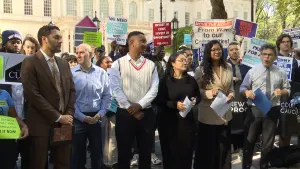Students of color don’t get equal opportunities to take advanced classes, a Team 12 investigation finds.
Kane In Your Corner researched data from every school district in New York, New Jersey and Connecticut and found significant inequalities still exist in all three states.
In some cases, experts say that may be due to a lack of resources, while in others, school staff may consciously or unconsciously be steering qualified Black and brown students into less challenging coursework.
By any measure, Jordan Fields was a standout at Columbia High School in Maplewood, New Jersey. She was an honors student and state champion in track and field. But she says several teachers, and one in particular, kept trying to talk her into dropping her honors and AP classes.
“I was so defeated, after having this woman continuously telling me that I was not capable of succeeding in her class,” she recalls.
Her father Water Fields says he became concerned about "the erosion of our daughter's confidence" and soon learned that other parents in the district also believed their kids had been discouraged from advanced classes. They formed a group called the Black Parents Workshop, and they sued the South Orange-Maplewood school district in 2018, alleging discrimination.
The district agreed to a settlement last summer, overseen by a monitor, in which it agreed to better integrate schools and provide Black students better access to advanced level classes. The district also wrote a letter to Jordan Fields’ college, explaining that she’d been the victim of bias from a teacher.
"I can still remember how embarrassing and painful that entire year was," Jordan Fields says, "and so to see a victory of this nature is - I can't put it into words."
The experiences of students in South Orange-Maplewood schools are not unique. Team 12 broke down data from the U.S. Department of Education and found while things are improving, students of color still get fewer academic opportunities. Kane In Your Corner broke down the numbers in terms of a virtual classroom with 40 seats. All calculations are based on data from 2018, the most recent year on file.
In New York, Black, Latinx and multiracial students make up 47% of total enrollment, which equates to 19 of 40 seats. But in AP classes, they only make up 32% or 13 seats. In New Jersey, Black and brown students overall would fill 18 of the 40 seats, but in AP classes, they’d only fill nine. In Connecticut, Black and brown kids would fill 20 of 40 seats in a classroom made up of all students, but only nine of 40 in one made of up of AP students.
Kayla Patrick, senior policy analyst for The Education Trust, believes that instead of students opting into advanced classes, any student who qualifies should be automatically enrolled.
“We know that just having access to gifted and talented programs, and elementary really makes a difference,” Patrick says. “Having access to eighth grade algebra really makes a difference. That means students can take calculus in high school, that means they don't have to pay for that course in college.”
Others, like David Sciarra, executive director of the Education Law Center, caution against imposing expensive mandates on school districts without providing funding to cover the costs.
As for Jordan Fields, she didn't let her high school experiences discourage her. She won a scholarship to the University of Pittsburgh and is now attending law school. She plans to focus her legal career on “helping create a better education system for children.” She says she does not consider what happened to her in high school to be a defining moment, but rather "as the beginning of a lifetime of work."
RELATED LINKS
US Department of Education Civil Rights Data Collection:
This is the same data we used to research our series. You can check data for your state, district or even your child’s individual school, and you can compare one state, school or district to another.
The Education Trust:
We interviewed Kayla Patrick, Senior Policy Analyst, for the series. The group also authored this report on inequalities in AP and honors classes.
Education Law Center:
More from News 12
2:34

Guide: Safety tips to help prevent home burglaries
2:19

Guide: Safety measures to help prevent fires and how to escape one
2:40

Mayor's budget cuts: A controversial solution amidst immigration crisis
2:07

Tips on how to avoid confrontation with sharks while swimming in the ocean
2:33

5 tips to prevent mosquito bites and getting sick from viruses
2:39
